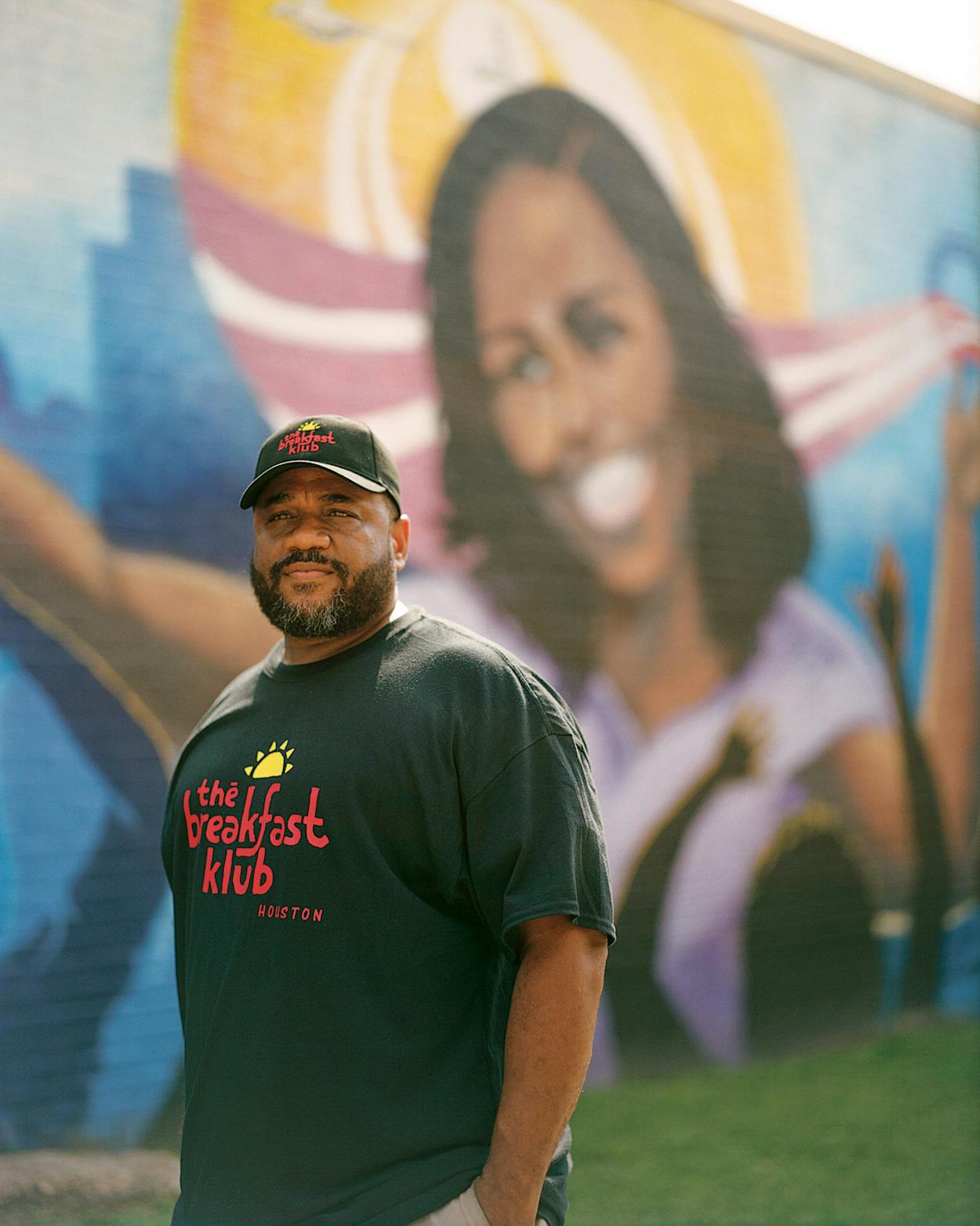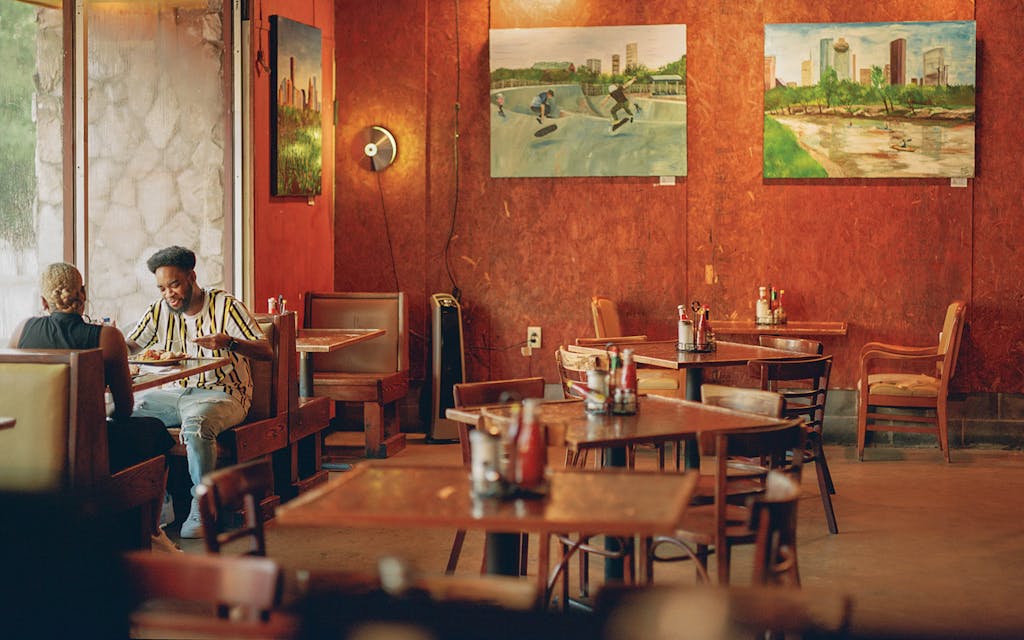How a Houston Restaurateur Built an Empire on All-Day Breakfast
Locals and tourists alike wait in lines that circle the block to eat at the Breakfast Klub. But Marcus Davis is serving much more than wings and waffles.

There’s an undeniable melody to Black Houston: notes of jazz music bounce harmoniously off club walls on Saturdays, and soulful gospel anthems fill Baptist churches on Sundays. In restaurants, the pop of sizzling oil melding batter to catfish and fried chicken joins in with the beat of big spoons mixing seafood and rice in hearty one-pot dishes. And for two decades, the Breakfast Klub has been the consistent, resounding bass line, serving both the community and award-winning food in equal measure.
Marcus Davis was just thirty years old when he opened his first restaurant, near Third Ward, a historically Black neighborhood just southeast of the skyscrapers of downtown Houston. A multitasker since his teen years, Davis had held various jobs in the food industry: waiting tables, managing fast-food chains, tending bar. In the two years before he became a restaurateur, he’d been a teacher and basketball coach at Sharpstown High School. When he wasn’t at work, Davis loved grabbing food with friends or catching some live music at a club with his wife, Mel. But he was nagged by the feeling that something was missing, and soon found himself in search of a new challenge.
He had always been interested in entrepreneurship, reading books and studying articles about how to operate a business, and he’d grown up surrounded by good food and music. Running a restaurant seemed like a natural fit. Eating well was simply part of his life, says Davis, who remembers coming home from school to dishes like gumbo and braised oxtail, much of them prepared by his father, Jerry, who had learned to cook from his grandmother. Jerry was a schoolteacher and principal who also found time to play the piano and work part-time as a chef, cook, and caterer. “[Cooking] was his passion, but he made money on these skills,” Davis says. “He was able to put food on the table with this talent.”
But Dad wasn’t the only culinary influence. “My mom had us young,” Davis says of his mother, Betty, and his two brothers. “We’re all two years apart. So, you know, you got these three boys. You teach school every day. You tired. Either we had been at work all day or school all day, or we’d been at church all day. So we would ride home. And my mom would say, ‘Y’all want breakfast for dinner?’ And it was almost like somebody hit a grand slam, because the car would just erupt in excitement.” The larger-than-life Afros that Davis and his brothers sported at the time would hit the roof as they gleefully bounced up and down. The usual dinnertime eats were great, but breakfast for dinner? That was something special.

The line of customers chasing comfort food and community vibes.
Photograph by Rita Harper

Davis’s famous Wings & Waffle.
Photograph by Rita Harper
Left: The line of customers chasing comfort food and community vibes.
Photograph by Rita Harper
Top: Davis’s famous Wings & Waffle.
Photograph by Rita Harper
That childhood joy no doubt informed Davis’s thinking in the fall of 1999, when he resigned from his teaching job and got serious about opening a restaurant. Looking around, he didn’t see many restaurants opting to serve breakfast throughout the day (aside from national chains) and decided that he’d be the one to do so. “Back then, breakfast wasn’t sexy,” Davis says. “We decided to reinvent that narrative.”
He did face resistance, though. “There was an abundance of fear and faithlessness from those around me, in part as a result of people not having seen success. Or seeing failure in these kinds of endeavors.” His mother thought the idea was too risky, and some of his friends didn’t see much promise in the part of town Davis was exploring. Today Third Ward bustles with successful businesses and shiny new apartment buildings, but in the early 2000s, the storied neighborhood was plagued by poverty and crime. Still, Davis looked past the abandoned buildings and decided that the corner of Travis and Alabama, close to major freeways and his alma mater, Texas Southern University, was perfect for his new venture. “I found that building while I was on a break at work, and the entrepreneur in me knew that this was the place,” he says. Years before chicken and waffles became a mainstay on every trendy Southern menu, Davis, with the help of Mel, Jerry, and a small but mighty kitchen staff, opened the doors of the Breakfast Klub.
In a world before social media, Davis hit the pavement with an aggressive grassroots marketing strategy. He handed out flyers to motorists stopped at traffic lights and attached bags stuffed with homemade muffins to the doors of nearby Midtown businesses. Just a few years after opening, he seized an opportunity for national attention by concocting a plan to get on the Tom Joyner Morning Show, a syndicated radio program that was geared toward Black Americans. One morning Joyner was stopping by Houston’s Majic 102.1 radio station. Davis got up at 4 a.m. and drove to the station to hand out exactly 102 neon yellow T-shirts emblazoned with the Breakfast Klub’s logo to fans waiting outside to meet Joyner, promising them a free breakfast if they put on the shirts. Joyner was tickled, so he mentioned the restaurant on air. (In a full-circle experience, when Joyner decided to hang up the mic in 2019, he came to the Breakfast Klub to do a final show.)
Within two years, the restaurant was seeing the first of its fabled sidewalk lines of hungry Houstonians, and twenty years later those lines are just as long. Seven days a week, regulars and tourists following “must-go” travel guides stand in a queue that circles the block, patiently waiting to sample signature dishes like the Wings & Waffle (an airy waffle dressed in flaky powdered sugar and nestled between crispy chicken wings) and the Katfish & Grits (buttery-smooth grits with eggs or potatoes and a massive, perfectly breaded catfish fillet).
But beyond the love of comfort food and an enthusiasm for the letter K, there’s something deeper at play here. Davis had always wanted to build more than a restaurant: he wanted a community center of sorts, a place where Black people could have a good meal and be themselves. As a young man, he had experienced racism; he knew how it felt to be subjected to everything from offensive comments to outdated dress codes. “I wanted a space for us, where the final decision didn’t rest with a white person deciding whether or not you meet their value scale,” Davis says. So he created an eatery that welcomes all Houstonians but foregrounds African American history and culture. Before guests even pass through the door, they’ve walked or driven by a frequently changing mural that reflects some element of Black American life. Through a longtime partnership with local artist Reginald Adams, Barack and Michelle Obama have graced this brick expanse, as has Houston native George Floyd. Inside, the walls are lined with art from local Black artists; the music of Erykah Badu, Duke Ellington, and Robert Glasper can be heard on any given day; and Black and Brown cooks and waiters work diligently to keep plates piled high with comfort food flowing from the kitchen to the tables. Many of the Breakfast Klub’s regulars are people like lawyer Lynne Liberato, who served with Davis on the board of trustees for the United Way of Greater Houston: “It’s comfort food. And you sit down and the whole atmosphere just makes you feel like you’re at home.”

Now the owner of an empire that includes a Breakfast Klub outlet at the airport, the popular Caribbean spot Reggae Hut, and Signature Kafe (a more upscale version of the Breakfast Klub in an adjacent building), Davis has watched his humble restaurant become an institution, where politicos meet and nearby university students hang out. Oscillating between restaurateur and community leader, he’s hosted voter-registration drives and public appearances from local leaders. He’s deeply involved in city activism, calling out inequities in the restaurant industry and vocally supporting the Black Lives Matter movement. The Breakfast Klub has distributed meals to struggling Houstonians during major events like Hurricane Harvey, and during the COVID-19 pandemic, Davis has been able to retain most of his staff and revamp operations to focus on takeout and catering for local hospitals and essential workers.
A frequent collaborator of the Breakfast Klub’s is S.H.A.P.E. Community Center (Self-Help for African People through Education), an organization that aims to improve the lives of Houston’s Black residents through social engagement and local activism. Cofounder and executive director Deloyd Parker has known the Davis family for decades and has worked with them on annual events like the Pan African Cultural Festival. “They contributed so much to the institutional growth of the S.H.A.P.E. Community Center and many other centers in our community,” he says. “I think [Davis] is an excellent example of what we need to do as a people, especially in the area of economic and business development.”
After twenty years in business, it comes as no surprise that Davis sees everything he’s accomplished as just the beginning. He’s as active as ever, serving on the PepsiCo Black Restaurant Advisory Council, a group that supports Black-owned businesses and restaurants, and making regular appearances on Houston’s morning shows. The Breakfast Klub keeps feeding thousands, and Davis keeps striving to better the city he loves. “There’s a benefit to doing good work,” he says. “There’s no place where that’s more visible than Houston, Texas.”
"all day" - Google News
September 01, 2021 at 04:15AM
https://ift.tt/2V1bpWQ
How a Houston Restaurateur Built an Empire on All-Day Breakfast - Texas Monthly
"all day" - Google News
https://ift.tt/35pEz2D
Bagikan Berita Ini














0 Response to "How a Houston Restaurateur Built an Empire on All-Day Breakfast - Texas Monthly"
Post a Comment